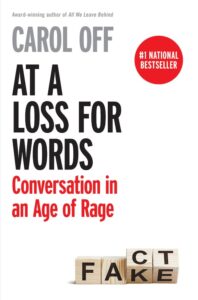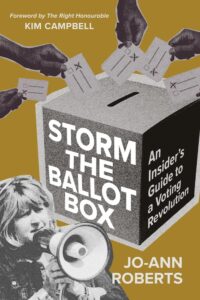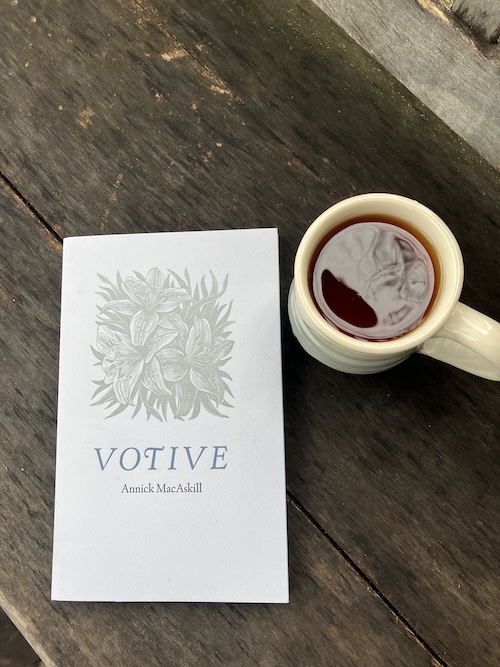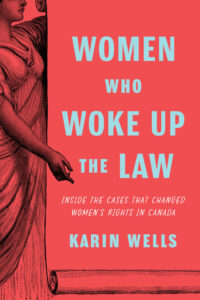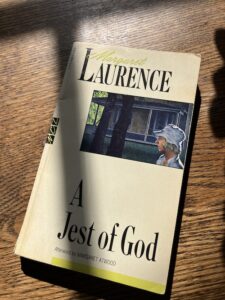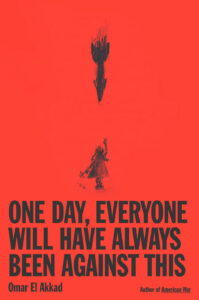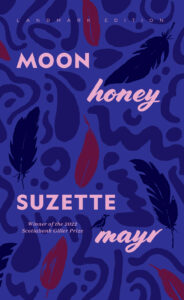April 1, 2025
At a Loss for Words, by Carol Off
“Populist politicians blame the government for the disparity between classes, feeding public resentment, distrust and anger. But that anger isn’t aimed at the 1 percent who play little to no tax, or at those whose obscene wealth can now pay for private trips into space for just lark. Instead of resenting the greed that drives the income gap, people direct their anger exactly where the agents of chaos want it directed—at government and civil society.”
Instead of looking for sense and meaning in newspaper live-blogs lately, I’ve been digging deeper and reading books, which definitely has helped with overwhelm, even when the books themselves are far from feel-good. (I’ve made a list of such books at 49thShelf: “Instead of Refreshing Your Feed.”) And former CBC journalist Carol Off’s At a Loss For Words: Conversations in an Age of Rage was positively chilling, instead of feel-good, but it was also so wise and made all sorts of connections between disparate things that look like random chaos from a distance, but Off shows that there’s nothing random about it. And that for decades, right-wing billionaires with nefarious intentions have been putting the pieces into place to lock in power for authoritarian leadership. And part of the way they’ve done this is by undermining our language, which is also our common ground, turning meaning inside out so that it becomes hard to know if anything is true. Off selects six words she explores to show how this has happened: Freedom, Democracy, Truth, Woke, Choice, and Taxes. Where do these words and ideas come from? How have their meanings and solidity been undermined, and who benefits from this happening?
What makes At a Loss for Words so important is its Canadian lens, highlighting the connections between what happens in Canada and the US, but also the ways in which Canada’s history is different. Throughout the book, she returns to her own childhood growing up, the child of parents who had rose to the middle class, and for whom the lessons of Europe in the first half of of the 20th century were close enough that they did not take for granted living in a pluralistic society where neighbours could think differently but also still have fundamental values in common.
This book was published in a world where the outcome of the 2024 US Presidential Election was still unknown, and it’s prescience is startling and disturbing—especially the part in the chapter in “Woke” in which she outlines Viktor Orban’s systematic dismantling of the university system in Hungary, how he brought these institutions under government control in a manner that the current US administration seems to be emulating to the letter. The implications are real and scary—former Canadian Prime Minister Stephen Harper is now head of a global organization dedicated to electing right-wing governments around the world, and Orban has called him “a great ally.”
At the end of the book, Off tells us that it’s still not too late to change course, which seems harder to believe here in 2025 than it might have a year ago. But knowledge and understanding of what’s really unfolding is imperative, regardless and, having read this book, at the very least I feel better equipped to meet the considerable challenges of the moment.
March 31, 2025
A Bird in the House, by Margaret Laurence
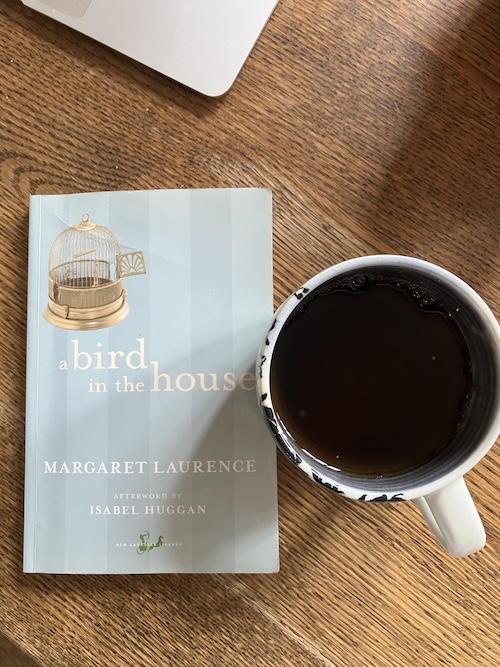
My Manawaka journey continues! Except that I picked up A Bird in the House thinking it was the book Laurence published after A Jest of God, but it was not! Not that it matters entirely, because the books themselves aren’t published in chronological order—The Fire Dwellers takes place before A Jest of God, but was published after it. (I would be curious to know what order these books were written in, and one way to get to the bottom of that would be to reread Laurence’s wonderful collection of letters to publisher Jack McClelland.) A Bird in the House is also a story collection and so it was likely written across a wide span of time (with stories first published in magazines like Ladies Home Journal, Chatelaine, Atlantic Monthly, and by the CBC, which makes me nostalgic for such a literary landscape). Anyway, I’d already started reading when I figured out my mistake, and because I’m cool and laidback, I just kept on going, and am not bothered by the mix-up at all. (Note: This is a lie. I am! Alas.)
Okay, so A Bird in the House might be the Manawaka book with which I’ve had the longest and least complicated history. The copy I have, I think, might have been swiped from my mom’s bookshelf, a Seal paperback, which had become entirely unglued and fell apart when I opened it after all these years. So I went to BMV and found a newer secondhand copy, a New Canadian Library edition with a foreword by Isabel Huggan, who I was friends with before the pandemic but we’ve fallen out of touch. And just like a story from Huggan’s collection The Elizabeth Stories, I believe I first encountered one of the stories from this book (either “The Sound of the Singing” or the title story “A Bird in the House”) in The New Oxford Book of Canadian Short Stories in my Grade 12 English class (which I wrote about here). I must have read the entire collection (which also constitutes a novel, a bildungsroman) at least once, but I don’t think I read it more than once, and the aspects of the story I remember are those I encountered in the short fiction anthology—young Vanessa, and the brick house where her grandfather lived, and the harbinger of death that was the sparrow, and then her father died not long after.
Unlike, say, The Stone Angel, stories from A Bird in the House are well suited for young readers, and Laurence’s narration is more traditional in these stories than her other books are, which are very much interior-focused. Vanessa MacLeod, on the other hand, is looking outward, telling the stories of her parents and grandparents, of the world around her, albeit not connecting any of the dots to understand or explain what those stories mean, and this means that my impression of these stories was that they were simple and straightforward, but it turns out that was just by perspective that was simple and straightforward, and I’m now wise enough to understand what was going on between the lines in these stories, the pains and struggles of these characters’ lives. I really read it and thought was about a house, a girl, and a bird, but there is so much more than that. My own dawning awareness is analogous to that of Vanessa herself:
“For me, the Depression and drought were external and abstract, malevolent gods whose names I secretly learned although they were concealed from me, and whose evil I sensed only superstitiously, knowing they threatened us but not how or why. What I really saw only was what went on in our family.”
And when she gets a little older and writes about the music of her youth: “The music seemed the only music that ever was or ever would be. I had no means of knowing that it was being set into the mosaic of myself and that it would pass away quickly and yet remain always mine.”
About war: “It was then that war took on its meaning for me, a meaning that would never change. It meant only that people without choice in the matter were broken and spilled, and nothing could ever take the place of them.”
March 27, 2025
Storm the Ballot Box: An Inside’s Guide to a Voting Revolution, by Jo-Ann Roberts
The big picture continues to be overwhelming and terrible, and I’m finding solace at the granular level, with books like STORM THE BALLOT BOX, by Jo-Ann Roberts, a long-time journalist whose career in politics began when she was a federal candidate for the Green Party in 2015. After years of covering Canadian politics, Roberts figured she had a good sense of how her candidacy would unfold, which turned out not to be the case, partly because politics is always different when you’re in the thick of it, but also because 2015 was a pivotal point in politics, with new dynamics brought on by social media, less local news coverage, a promise by the Liberals of voter reform, and a whole lot of weirdness. (Remember the guy who peed in a mug?).
In this breezy and engaging book, combining memoir and reportage, Roberts shares her experiences in politics, and also shares her frustration with the fact that so many Canadians she encountered through her door knocking were disengaged with the political process. (Not me! I’ve only missed one election in my adult life, when I didn’t bother to show up to vote between David Miller and Jane Pitfield for Mayor in 2006, because I knew he was going to win and was fine with that, and I’ve been embarrassed about this ever since, that I would have been so blase about this right who other people have died for.) She also shares her understanding, however, about why it might be so easy for so many to feel disengaged with the political process—the allure of strategic voting, which limits real choice; the way that polls end up determining the story instead of telling it; the broken promise of proportional representation; parties engaging in disinformation instead of talking about the real issues that matter to Canadians; the unequal ways in which Canadian political parties are funded; and more.
To all these problems, Robert offers real and practical solutions—and also smart explanations, though I must admit that I still don’t understand what a polling margin error means in the slightest, but that’s the point, really, and maybe I should stop reading up on polling numbers like I do. What if media outlets were only permitted to release polls within a particular margin of error? What if Elections Canada was made responsible for voter turn-out? Roberts proposes a referendum on electoral reform, followed by an election under the new rules, and then another referendum for Canadians to determine if they wanted to keep the process? What if political parties were removed from ballots? (And did you know that political parties were not recognized under law in Canada until 1970?)
Storm the Ballot Box is as fascinating as it is inspiring. This is the kind of revolution we need.
March 24, 2025
Votive, by Annick MacAskill
In February (for the second year running!), my eldest daughter’s high school drama group won their district-level competition for the NTS Drama Festival (which many of us will recognize from back when it was the Sears Drama Festival), and I’m very excited that they’ll be part of the regional competition at Hart House Theatre in April performing their wonderful play, something infinitely more useful than poetry.
And I’m excited, not just because the play is terrific (it is!), but because it’s based on poetry by Governor’s General Award-winning Annick MacAskill, whose beautiful books are published by Gaspereau Press in Nova Scotia, and the opportunity to see teenagers reciting Canadian contemporary poetry like they mean it is so good for my heart. It also meant that I had a perfect excuse to buy MacAskill’s latest book, Votive, and leave it lying around the house and my teen would even pick it up and flip through it.
Votive includes the poem “Praying for Rain,” which closes the performance, and from which the play takes its title, my daughter reciting, emphatic, “Still rain/ seemed like the only hope,/ the way it might charge the gaps/ left by humans, machines, and words.” (The high school performance does not continue into the next line about hot flashes….)
I loved this book, whose allusions include Freddie Prize Jr, Calla from Margaret Laurence’s A Jest of God, Penelope, and Sinead O’Connor. These are poems about rituals, about devotion, religion, love, coming-of-age, queerness, knitting environmental devastation, the internet, good poems, bad poems, and the patron saint of rain.
Bring it.
March 14, 2025
All the Days and Nights, by William Maxwell
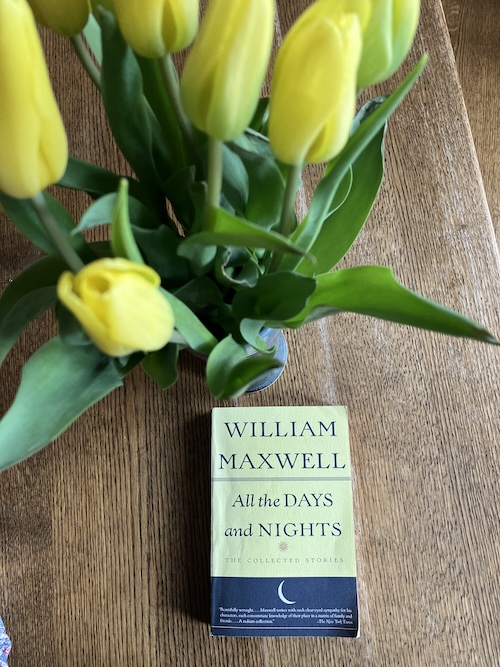
My first William Maxwell was his novel The Chateau, which I read a couple of years ago in a reading group all about books about houses that Anne Fernald ran online via the Center for Fiction, and that book was the perfect introduction to Maxwell, who published six novels between the 1930s and 1980s, along with many short stories, and also was fiction editor of The New Yorker from 1936 to 1975. Maxwell is the most Woolf-influenced male author I’ve ever encountered, and The Chateau made that clear, although not as clear as his second novel They Came Like Swallows, whose structure borrows much from To the Lighthouse and which is based on Maxwell’s mother’s death in the 1918 flu epidemic. It’s a biographical thread he picks up again and again his fiction, including in the short stories collected in All The Days and Nights, which makes for a strange and emotional experience for readers familiar with his preoccupations—unlike his characters, we know what’s coming, and yet haplessly hoping for some other outcome all the same. There’s something so vulnerable and real about Maxwell’s characters, their flaws and imperfections. He’s the only mid-twentieth century author I’ve ever read whose male characters struggle with infertility, which was also based on Maxwell’s own experience, and the way he writes about love and marriage is so tender and moving and honest. He writes about people at the mercy of fate, and I really love his work. So very much that I even read the entirety of his collected stories, which is a big deal. Big doorstop collected stories are nice to have, I guess, but not great for reading, and the only one I’ve ever successfully completed is Grace Paley, and she didn’t even write that much. Poor John Cheever’s collection just sat gathering dust on my bookshelf for years until I finally gave up the ghost, and got rid of it. But William Maxwell! I read the whole thing, and it was really great.
March 10, 2025
Women Who Woke Up the Law, by Karin Wells
Karin Wells’ Women Who Woke Up the Law is hardly a feel-good book—it tells the stories of women who had to fight for very little, and often didn’t even get it—but it made me feel good anyway. Not because of good triumphing over evil, because in the end justice prevails, nope, not that at all. But instead because it tells the stories of women (and their lawyers, many of whom were also women) who nevertheless persisted, planting seeds that might take decades to grow, if ever, stories of the incremental pace of progress (along with requisite setbacks). Progress is not inevitable, as we’ve never learned in starker clarity than we’re learning right now as decades of progress are ripped apart and there are even people cheering for it. But progress is still possible, and it takes courage, and grit, and the work of it is hard and often unrewarding. And yet.
Wells, whose previous works instead one of my favourite books about Canadian history, The Abortion Caravan, once again brings the past to life with Women Who Woke Up the Law, each chapter telling the stories of the women behind fundamental changes to Canadian law. These include Eliza Campbell, whose gravestone at Mount Pleasant Cemetery still proclaims “I Did NOT Commit Adultery,” after she was accused by her husband, and fought valiantly for her reputation (and alimony), leading to eventual changes to Canadian divorce law. Also Emily Murphy, the first female magistrate in the British empire, “a complicated and dubious feminist icon,” who was part of a push to give women a share of their husband’s estates. Florence Murdoch, a ranch wife and survivor of brutal spousal abuse (she was beaten so hard to had to have her jaw wired shut) who fought for a portion of the ranch she’d put years of work into, though the Supreme Court of Canada would declare her not eligible, that her “twenty-five years of cutting hay, moving, dehorning, vaccinating and driving cattle… ‘was the work done by any ranch wife.'”
Wells shares stories of women whose courage helped to slowly move the needle on consent laws; of a woman who fought the system for unemployment insurance when she left work to have a baby (judges that argued that women could not be victims of sexual discrimination because in order for there to be discrimination, men and women would have to be equal, which they were not); of Jeannette Corbiere Lavell who fought to keep her Indigenous status after she married a non-Indigenous man (Indigenous men did not suffer such a penalty when they married non-Indigenous women); Chantale Diagle whose abusive partner tried to prevent her from accessing an abortion in the 1980s; Jane Hurshman who killed her sadistic partner after years of abuse and would go on to speak publicly about domestic violence; and Viola Desmond and Rachael Baylis, two Black Canadian women who, decades apart, would help to bring intersectionality in legal parlance. And so many more ordinary extraordinary lives.
As with her previous books, Wells is skilled at pulling threads and making connections, weaving these wide-ranging tales into a fascinating tapestry.
March 7, 2025
A Jest of God, by Margaret Laurence
Of all the books in Margaret Laurence’s Manawaka cycle, A Jest of God is the one that made the faintest impression on me, resonating mostly because Rachel, its protagonist, was Stacey Cameron’s elder sister. Stacey from The Fire Dwellers, the Laurence book that meant the most to me, I think, because of its preoccupation with the domestic and the kind of female life I understood. Stacey is a wife, a mother, which gives her a kind of legitimacy Rachel even acknowledges in A Jest of God, in comparison with her own experience—she still lives with her mother in Manawaka, didn’t complete university, teaches Grade 2 in the very classroom she’d attended as a child. Much like Hagar in The Stone Angel (which I reread recently, and failed to love), Rachel lives invisibly, a small and quiet life that is making her crazy. It’s the kind of life that, like that of an elderly woman, I would have scarcely acknowledged as a younger reader. It occurs to me that Laurence writes the gradients of female experience that I was too far away to see at the time, the way I’d thought of Hagar Shipley and Morag Gunn as just two old broads, never mind that there are forty years and a whole lot more between them. The way that I never saw Rachel at all.
Rachel is an easier person to share a stream of consciousness than Hagar was. She has similar pride and fear of being vulnerable, but it not quite so unwavering about it. Her hard shell is not her most defining feature. She’s also 60 years younger and still knows what’s what, a little bit savvy, a little bit willing to strike out and try. During the summer in which the novel takes place, she starts seeing an old classmate whose back in town for the season, and allows herself to fall into a fantasy of a future for them as a couple. He takes her out into the countryside and lays down a blanket so they can have sex without worrying about thistles and brambles, which might be the most care any man has ever shown Rachel ever. Although it’s not doing to end well, the reader realizes. That Nick Kazlik is never going to be driving Rachel Cameron’s getaway car, that she’s going to have to find a way to change her life on her own—and she does. The ending of this book (and there’s a whole lot more going on, particularly the biblical allegory that’s inaccessible to me) is really a triumph. I’m grateful for the chance to return to this one again.
March 4, 2025
One Day Everyone Will Have Been Against This, by Omar El Akkad
“It is very important to do the right thing, eventually,” writes Omar El Akkad near the end of his new book, One Day Everybody Will Always Have Been Against This, a book which, if/when I post an image of its cover on social media, will make some people angry and disappointed with me. “Eventually” the word on which El Akkad’s sentence hinges, tying back to his title, which comes from a tweet he posted on October 25, 2023, three weeks into Israel’s bombardment of Gaza.
Two weeks before that, I’d reposted an Instagram story about an Israeli rocket hitting the Al-Ahli Arab Hospital, and then took it down after doubt was cast about the rocket’s origins. It is very important to do the right thing right now, I thought, to be cautious and responsible, verifying facts, not to spread misinformation. I took down the post. (In a January 3, 2025 release from the United Nations, after Israel’s December 27 attach on the last functioning hospital on North Gaza, a medical worker reports that “that wearing scrubs and white coats is like wearing a target on their backs.” At that date, the WHO had verified 654 attacks on healthcare facilities in Gaza.)
At a certain point, I pretty much stopped reposting stories about Gaza. Which is not silence, or violence. It is very important to do the right thing, so I must tell you that I continued to write about it in my own words, on my blog and in social media posts, but I was wary of the reposts, of just what I was doing with that project. Who was I talking to? Was it the people in my own community who are stranding up for Palestinian freedom, needing them to know that I too was on the right side? Was it those in my circles who put up Israeli flags on their accounts on October 7, wishing I could follow up and ask them how they felt about that? Or those people I love who fly no flags at all but whose relationship to Israel is ambivalent, complicated?
There really are some parts of this story which are allowed to be complicated. And one of these is two sides insisting on their moral clarity. Sharpie debates scrawled on utility poles around my neighbourhood and all over the garbage can at the subway entrance. Dueling sound systems turned up to full blast. Members of my community being drawn into a right-wing media-sphere full of outright lies and fear-mongering. Rifts in the Canadian literary community that have hurt many quiet people deeply, whether I think those feelings justified or not. And yes, the endless focus (locally at least) on people’s feelings while bodies are being blown apart, the trouble of feelings being the focal point we keep returning to. That some lives get to be mourned and others collateral damage. So much noise.
But in his new book, El Akkad, who was born in Egypt, grew up in Qatar and Canada, and was awarded the 2021 Scotiabank Giller Prize for his novel What Strange Paradise, cuts through all of it to create something most essential, to show the hypocrisy at the core of Western Liberalism as the world does nothing while tens of thousands of Gazans are brutalized, murdered. He writes, “There exists no remotely plausible explanation for a moral worldview in which what a protester might hypothetically do to a hospital [in Toronto] deserves the strongest condemnation, while what a military does—has done—to multiple hospitals deserves none.”
This is not only a failure toward the people of Gaza, it’s a failure to ourselves, to the moral foundation we purport to stand on. El Akkad writes, “Of all the epitaphs that may one day be written on the gravestone of Western liberalism, the most damning is this: Faced off against a nihilistic, endlessly cruel manifestation of conservatism, and someone managed to make it close.”
I don’t think this is a book to be debated, to be countered in the back-and-forth manner of the garbage can sharpie debates (which, I will tell you, have failed to yet add an original element to the conversation or change anybody’s mind). This is a deeply thoughtful and considered book that needs to be understood more than it needs to be agreed with or dismissed altogether. It’s the story of El Akkad’s falling out of the love with Empire, with the Western project that so enticed him as a young person growing up in the Middle East where freedom was curtailed and corruption reigned, a promise of something better, but which has again and again failed to live up to that promise.
He is done with it. He writes, “Everywhere there is a great rage simmering, boiling over, and everything feels like an argument. But there are no arguments to be had anymore.”
February 27, 2025
Moon Honey, by Suzette Mayr
27 years before she won the Giller Prize for her novel The Sleeping Car Porter, Suzette Mayr released her debut novel, Moon Honey, a book that begins with a young white couple, Carmen and Griffin, having sex under a pool table in Griffin’s parents’ basement, the third time they’ve ever done it, and in the midst of things Carmen smacks her head on the table leg, passing out for about a minute, but Griffin doesn’t notice. Griffin doesn’t notice much, barely reacting at all when, not long after the pool table incident, Carmen is transformed into a Black woman, except to find the premise sexually exciting. His mother, Fran, on the other hand, who never liked Carmen in the first place, is almost relieved to have her virulent racism as a hook on which to hang her dislike for her son’s partner, but doesn’t have time to be comfortable there before she has her own transformation, part of a maternal legacy. Such metamorphoses punctuating the book—a bridesmaid who turns into a horse the bride rides out on, another bride who turns into a LITERAL asshole. Anything can happen in Moon Honey, limits to be pressed like luck, and the result is wild and rollicking magic. Out now in a brand new edition from from NeWest Press.
February 21, 2025
Anastasia Krupnik

My family is reading The Iliad aloud (turns out we’re Homer completists; after reading Emily Wilson’s The Odyssey a few years back, it only seemed natural) but nobody is enjoying it. It’s as boring, bloody, and stagnate as the Trojan War, and then when my kids found out the horse wasn’t even in it, they were furious. I’m not ready to give up on The Iliad yet, however, and so we’re interspersing its books with lighter and more satisfying fare, which most recently was Lois Lowry’s novel Anastasia Krupnik, the first title in her series about the quirky daughter of a poet and a painter growing up in Cambridge, Massachusetts.
I bought an Anastasia boxed set for my children a few years ago (tragically, does not currently seem available!), and while we’ve since read Books 2-4 all aloud and absolutely loved them, I hadn’t read them the first book yet—it’s a bit different, set when Anastasia was only 10, before she moved into her tower bedroom in the suburbs and her little brother, Sam, was born. In my mind it was more idiosyncratic than the other titles, and maybe that’s true, but now I’m not sure why I held back at all, because it’s just as great, maybe even more so, and it turns out it might also be my own personal urtext.

There were so many things in this book that I thought were MY things. Like when Anastasia (when she’s going through her wanting to be Catholic stage) makes the sign of the cross while thinking to herself “Forehead. Belly button. Left nipple. Right nipple.” And having a beloved wart. (RIP the wart on my finger that fell of when I was 24.) Being a list-maker. And maybe even living in the kind of household where children do precocious things like be read The Iliad (which doesn’t happen in this book, but I feel like it could…)
